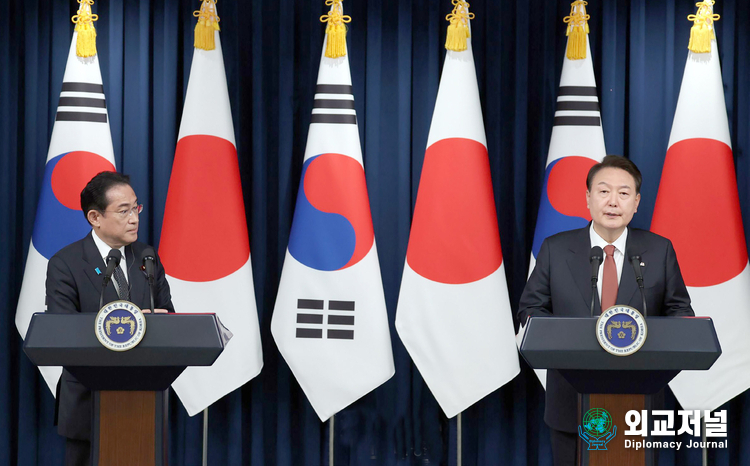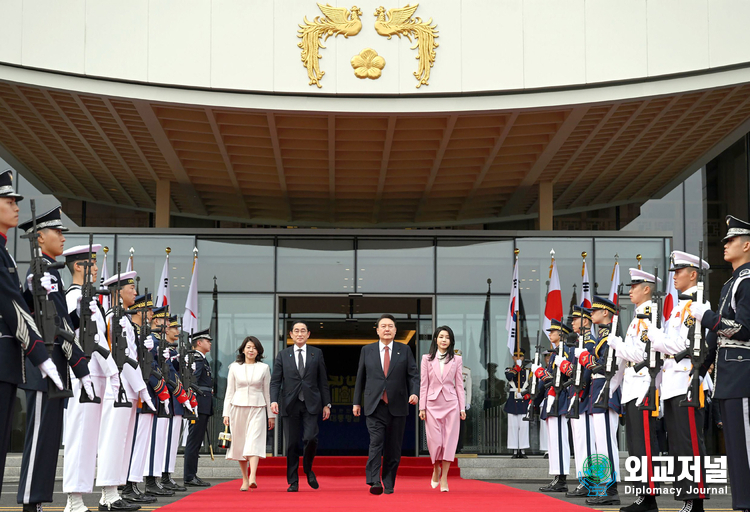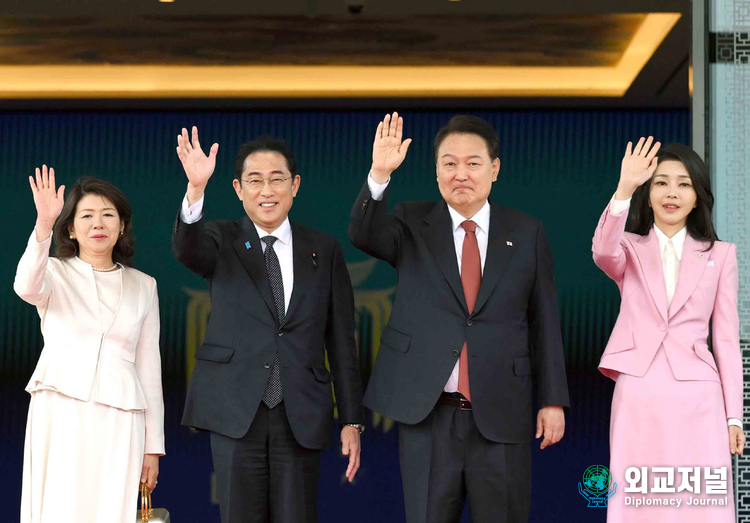
President Yoon expresses deep sympathy for the victims of forced mobilization, in response to Japanese Prime Minister Yoshihide Suga's statement, during the Korea-Japan summit held on May 8th. President Yoon stated that he "feels heartbroken for those who suffered in difficult and sad circumstances."
During the 19th Cabinet Meeting held at the Blue House, President Yoon emphasized that if both Korea and Japan face their dark history with sincerity, they can overcome the challenges and create a new future. President Yoon stated that during the Korea-Japan summit, the two countries will discuss cooperation plans in various fields such as economy, industry, science, culture, and human exchange in depth. Regarding the issue of handling contaminated water from Fukushima, President Yoon announced that a team of experts from South Korea will be dispatched to the site for inspection.
President Yoon also explained that the security of South Korea has undergone a transformation, as they no longer rely solely on North Korea's goodwill. He also highlighted that they have resumed joint military exercises with the United States, which had been suspended for several years, and strengthened practical training. The mutual defense treaty between South Korea and the United states, which was based on conventional military capabilities in the past, has been upgraded with a nuclear capability.

President Yoon Suk-yeol's speech at the 19th Cabinet meeting.
ast Sunday, as Prime Minister of Japan, Mr. Kishida visited Korea for the first time in 12 years.
The shuttle diplomacy between South Korea and Japan, which resumed with my visit to Japan on March 16th, required 12 years of effort. However, it took less than two months for the leaders of the two countries to start exchanging visits.
Prime Minister Kishida expressed his sympathy for the victims of forced mobilization, saying that he deeply feels the pain and sadness they have experienced in harsh conditions. If we face our dark past with sincerity, both Korea and Japan can overcome the difficulties they face and open up a new future.
At this Korea-Japan summit, we discussed cooperation plans in various areas such as economy, industry, science, culture, and people-to-people exchanges in depth. In addition, we decided to dispatch a field inspection team composed of our experts to deal with the Fukushima contaminated water issue. Next week, at the G7 summit, the leaders of Korea and Japan will together visit the memorial for Korean victims of the Hiroshima atomic bombing.
Things that were unimaginable just a short while ago are now happening between Korea and Japan. If Korea and Japan, who share the values of freedom and democracy, build trust through exchange and cooperation, they can pioneer a new future beyond the best times of the past Korea-Japan relationship.
I urge each ministry to carefully follow up and implement the cooperation measures discussed at the Korea-Japan summit, so that our citizens can directly and indirectly benefit from them.

At the upcoming G7 summit, a trilateral summit among the leaders of Korea, the United States, and Japan will also be held. Following the Washington Declaration agreed upon during my state visit to the United States last month, which strengthened the extension of North Korea containment between Korea and the United States, we can further solidify our solidarity through security cooperation among Korea, the United States, and Japan to build peace in the region.
There is no area where as big a change has occurred as in diplomacy and security when I think about this time, a year ago, when I took office as President. Through the South Korea-U. S. summit held just 11 days after the inauguration, the South Korea-U.S. alliance was effectively rebuilt. Last June, I attended the NATO summit as the first Korean leader to do so.
At the NATO summit, countries sharing universal values discussed ways to establish solidarity in freedom and cooperation for global security, which has changed from regional security. In addition, on the occasion of the NATO summit, South Korea strengthened its practical cooperation in the fields of nuclear power, semiconductors, and supply chains through bilateral talks with various countries and achieved results in defense exports.
Now, South Korea's defense industry is moving forward vigorously with the goal of becoming one of the top four defense exporters in the world.
In September of last year, the "New York Initiative" was announced at the UN General Assembly and New York University, proposing solutions for bridging the digital gap and establishing a new normative order in the digital space, as well as digital ODA.
During a recent visit to the United States, in a Harvard speech titled "A New Journey Toward Freedom," the importance of global citizens' solidarity and cooperation to prevent the misuse of digital technology that infringes on freedom was emphasized.
For the past year, I have been promoting top-level sales diplomacy as South Korea's No. 1 salesperson.
On the occasion of the visit of Saudi Crown Prince bin Salman last November, we signed 26 MOUs worth about KRW 40 trillion. As a result, in March of this year, we held the groundbreaking ceremony for the $9.3 billion Shahin Project by Essoil, which was our first achievement. In particular, during the UAE state visit in January of this year, we attracted strategic investments worth $30 billion.
Through these large-scale investments in oil money, we expect to provide great support for our promising startups, venture businesses, and small and medium-sized enterprises to leap into global small and medium-sized companies. We will continue to work hard to put the economy at the center of diplomacy, expand exports of our products, and attract investments from foreign advanced companies.South Korea's security, which relied only on North Korea's goodwill, has also undergone a transformation. We are strengthening our three-axis defense system.
In addition, we resumed the South Korea-U.S. joint military exercises, which had been suspended for several years, and strengthened practical training. The mutual defense treaty between South Korea and the United States, which was based on traditional military power, has been upgraded to a nuclear-capable one.
Through the Washington Declaration, a summit-level agreement, and the establishment of the Nuclear Cooperation Group (NCG), the United States has promised defense, including nuclear weapons, at an unprecedented level for South Korea, and South Korea has strengthened its expansion deterrence through joint planning and execution of U.S. nuclear asset operations.

